Report Card: Grading the U.S. Open

Andy Murray won his first Grand Slam title and Serena Williams got her 15th. (AP; Getty Images)
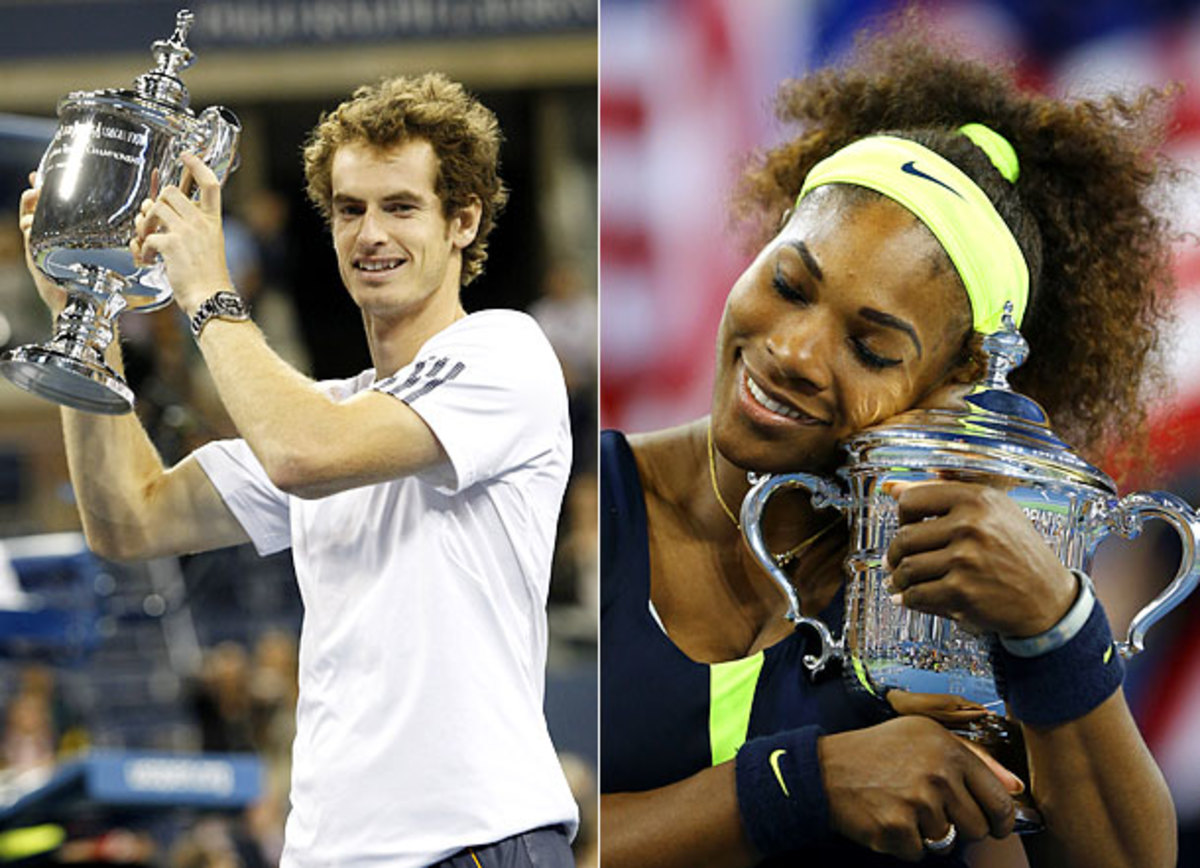
The Report Card hands out grades for the week in tennis. This week wraps up the U.S. Open.
Andy Murray: A. Could you write it any better? Murray won his first career Grand Slam title on the very day that Fred Perry collected his first Grand Slam title 79 years ago at -- that's right -- the U.S. Open. Murray managed the windy conditions better than Novak Djokovic, proved to be the fitter player and recovered after squandering a two-sets-to-none lead despite all the doubts that swirled in his head. So a Scot ended 76 years of British futility, and he did so by rejecting the British tennis system -- Murray moved to Barcelona at age 15 -- that he felt would hold him back. More storylines than an episode of Lost, this.
Murray admitted he didn't play his best tennis in New York and he's right. Feliciano Lopez and Marin Cilic challenged him, and who knows what would have happened if the wind didn't descend for his semifinal against Tomas Berdych. But this is precisely what Murray needed: to prove that he could win a Slam without playing out-of-his-shoes tennis. That's what champions do.
Serena Williams: A-plus. Just like in the Wimbledon final, Williams was forced to a third set only to pull herself out of a funk quickly and suddenly to vanquish a game but relatively inexperienced opponent. Subpar for most of her final against Victoria Azarenka, Williams came back from a break down in the third set to win the last four games. And thus endeth the Summer of Serena. Wimbledon singles and doubles champion, gold in Olympic singles and doubles, and her first U.S. Open title in four years. Given her second-half success, it's not a question of if Serena will get back that No. 1 ranking. It's only a matter of when.
Novak Djokovic: A-minus. Blame it on the wind, which he struggled to handle; the USTA's scheduling woes that made him play back-to-back matches in the semifinals and finals; or destiny, which seemed to back his Scottish opponent on Monday. The bionic body that enabled Djokovic to endure a near-six-hour grind with Rafael Nadal at the Australian Open in January failed him in the final set, and though he continued to fight and press and keep the pressure on, Murray seized his moment. Djokovic is still the best hard-court player in the men's game, as he showed in his mind-blowing display of defense-to-offense against Juan Martin del Potro in the quarterfinals. No. 1 is still within his reach as the fall swing kicks off, which means his season is still very much primed to be rewritten come November.
Victoria Azarenka: A. If we're going to praise Williams so much, then we have to give an Ashe Stadium-sized chunk of credit to Azarenka. She forced Serena to earn it. In getting two points away from winning her first U.S. Open, Azarenka made Williams pay for her uneven play and didn't succumb to Serena's intimidating presence. Azarenka played about as well as she could and as a result Williams had to raise her game late in the third set to overcome the top-ranked player.
Maria Sharapova: B. Sharapova rolled through the early rounds and then was on the verge of defeat twice, against Nadia Petrova and Marion Bartoli, narrowly squeaking by with the help of some well-timed rain delays. The rain never came for her semifinal against Azarenka. She battled as usual, but even when up a set and a break Sharapova was smacking her racket to the ground and sulking with frustration like a woman on the verge of a loss. That was evidence enough of Azarenka's undeniable tenancy in Sharapova's head.
Tomas Berdych, who upset Roger Federer, made his first U.S. Open semifinal. (Alex Trautwig/Getty Images)
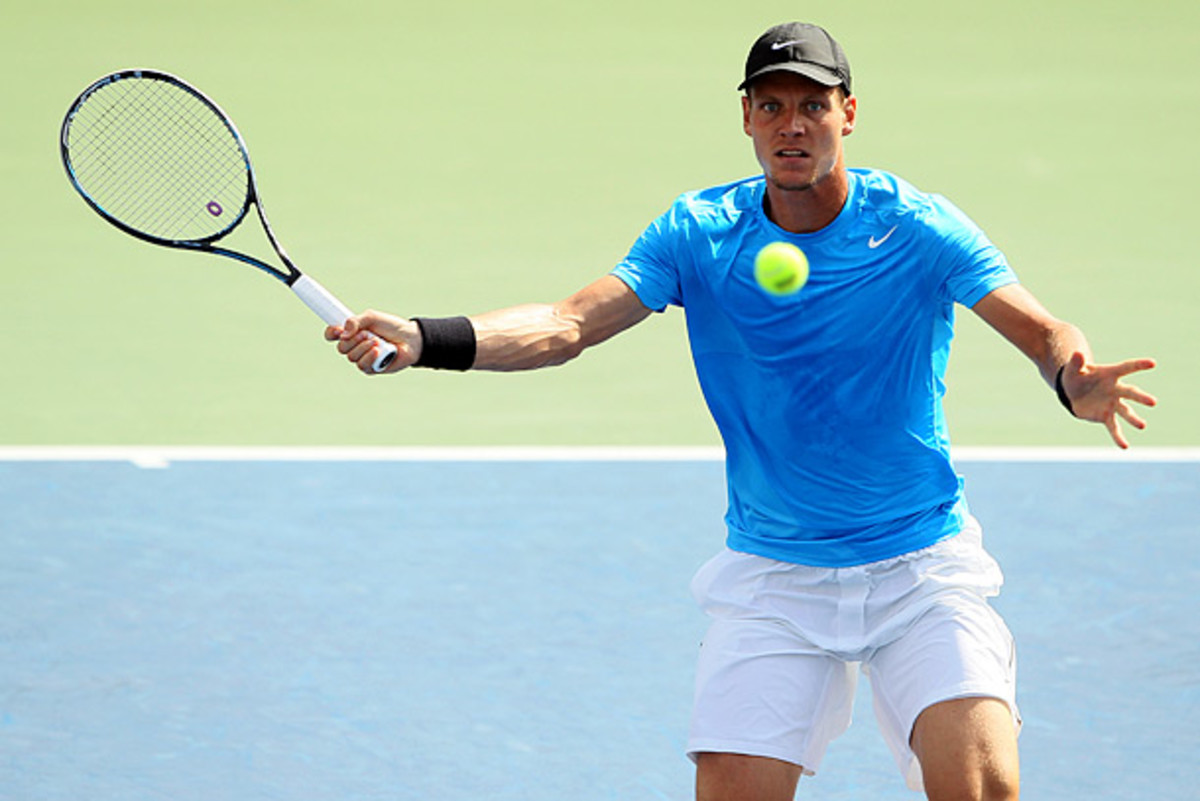
Tomas Berdych: A-minus. The ball-crushing Czech has a reputation of being a bit soft in the head under pressure, but his resiliency was a big story in the second week. After choking away the third set to Roger Federer in their quarterfinal, Berdych rebounded to calmly take the fourth set and the match. He did the same thing against Murray, refocusing after a two-set walkabout to force a fourth-set tiebreaker, which he ultimately lost. Still, this was a tournament to remember for both Berdych and tennis watchers. For so long the inevitable Berdych collapse was as reliable as death and taxes. Not so much anymore. That's a good thing for the sport.
David Ferrer: A-minus. Blame Andy Murray, David. If Murray hadn't needed almost four hours to dispatch Berdych, Ferrer might have been able to take to a swirling Ashe sooner and use the blustery conditions to beat Djokovic in the semifinals. As it was, Ferrer only had enough time in the wind to build a 5-2 lead before the match was suspended. Ferrer finished off the set after the match resumed the next day, but from there Djokovic cruised. Still, a great tournament for Daveed. His comeback from 1-4 in the fifth set against Janko Tipsarevic in the quarterfinals was yet another reminder of his competitiveness and resilience.
Bob and Mike Bryan: A. Champions' problems: The ribbon around their Olympic gold medal is fraying and Bob said a woman actually dropped it on the ground, taking a chunk of gold out of it. Not that the Bryans care. They have been riding the wave of that success all summer. In avenging their loss to Leander Paes and Radek Stepanek in the Australian Open final, the Bryan brothers set an Open Era record with their 12th doubles title.
Sara Errani and Roberta Vinci: A. High marks for their singles runs, with Errani reaching her second Slam semifinal of the year and Vinci making her first career Slam quarterfinal thanks to a fourth-round victory against then-No. 2 Agnieszka Radwanska. Errani looked absolutely gutted when she beat her best friend and doubles partner in an all-Italian singles quarterfinal, but the two had their chance to laugh, celebrate and dance a few days later when they beat Andrea Hlavackova and Lucie Hradecka to win their second Slam title of the year. Vinci's Slap-Snap-Clap dance is one of my favorite moments of the tournament. Great stuff.
American girls: A. The U.S. girls swept the juniors event as Samantha Crawford, 17, marched to the singles title as a wild card and 16-year-olds Taylor Townsend and Gabrielle Andrews teamed up for their second Slam doubles crown. And how about some props to Townsend for how well she managed the controversy when the news broke that the USTA refused to pay her travel expenses until she slimmed down? (The USTA, citing a "miscommunication," eventually said it would reimburse Townsend.) Townsend handled the attention -- both positive and negative -- perfectly.
Janko Tipsarevic: B. The Serb No. 2 commanded the stage in his five-set quarterfinal loss to Ferrer. He played some of the best tennis of the tournament in spurts, the gifted shot-maker embracing the challenge of competing against a premier defender. As a result, he was one-half of the best men's match of the tournament. That doesn't mean Tipsarevic didn't have some missteps throughout the event. If Ferrer had lost, who knows what would have been made of Tipsarevic's medical timeout when facing two break points at 4-4 in the fifth set. It was a questionable move, particularly in light of the fact that Tipsarevic played two explosive points immediately afterward. Then there was his calling anyone who believed in equal prize money "idiots" on Twitter. Tipsarevic might want to let his tennis do the talking.
Roger Federer: C-plus. Federer carried his exemplary summer form through the first three rounds, but after getting an extra few days of rest following Mardy Fish's withdrawal, the No. 1 came out rusty against Berdych in the quarterfinals. The fight was there but his timing was off, spraying forehands wide and being unable to hang in the long rallies with Berdych. To be fair, the way Berdych was playing he might have beaten Federer even if the Swiss was having a good day. But Federer gave away too many free points against a guy who has a history of buckling under pressure.
Petra Kvitova: B. There wasn't much Kvitova could do against an absolutely on-fire Bartoli, who won 12 of the last 13 games and 22 of the final 25 points in their fourth-round match. But Kvitova proved to herself this summer that she could be successful on North American hard courts, a big step forward for her. Now let's see if she can rule the indoor courts in the fall like she did last year.
Juan Martin del Potro: B-plus. As USA Today's Doug Robson said on Twitter, you won't see a guy play a better set and lose than the one Del Potro put together against Djokovic in the quarterfinals. Del Potro's sheer power and Djokovic's lightning-fast defense in the second set (which Djokovic won in a tiebreaker in 1 hour 24 minutes) took away everyone's breath. The match confirmed, as most of this year has, that Del Potro is getting closer to the level that won him the U.S. Open in 2009. Del Potro also deserves kudos for the class he showed on the night he ended Andy Roddick's career.
Laura Robson knocked off major champions Kim Clijsters and Li Na en route to the fourth round. (Elsa/Getty Images)
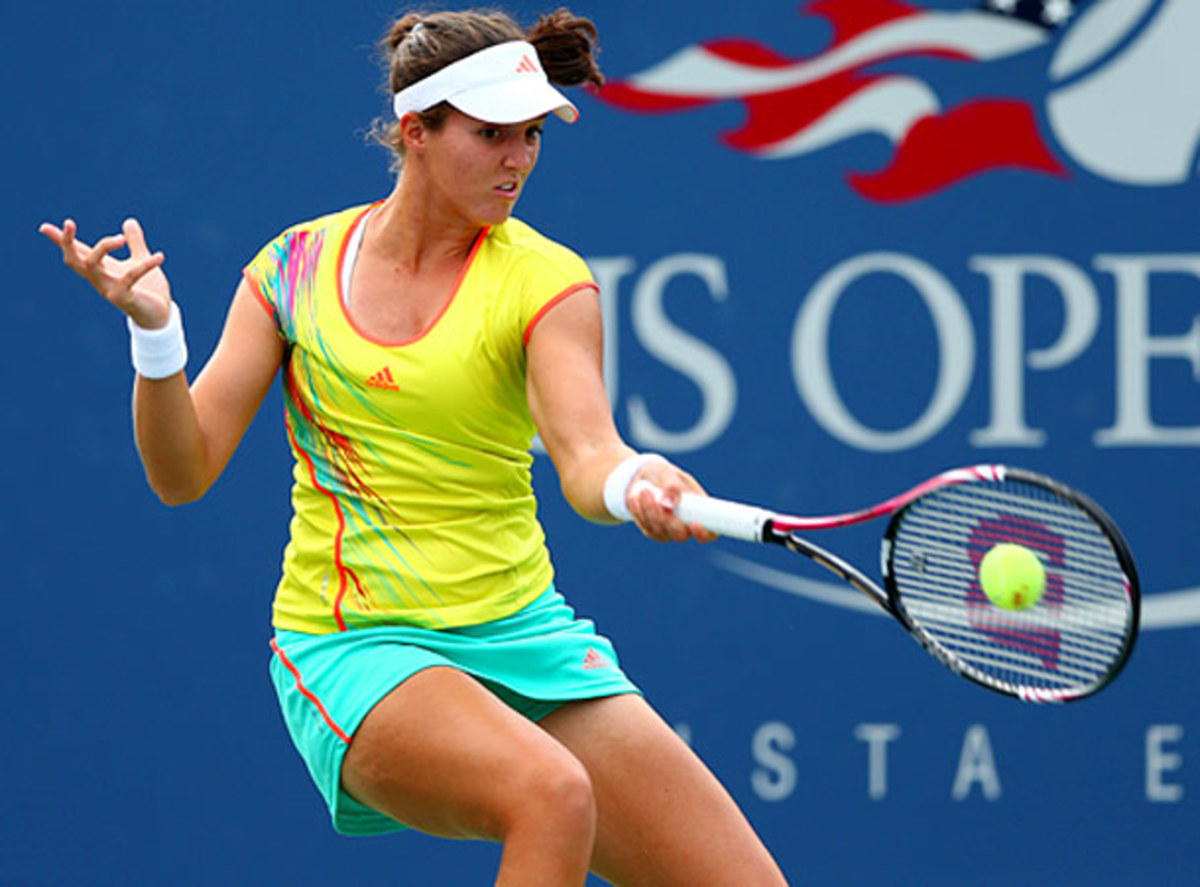
Laura Robson: A. Notwithstanding the retirement talk surrounding Kim Clijsters and Roddick, the 18-year-old Brit was the story of Week 1. It wasn't just the victories but how Robson achieved them. She rallied from 2-5 down against Clijsters to win in two tiebreakers in the second round, and bounced back from losing a tight second-set tiebreaker to Li Na to run away with the third set in the third round. Robson then saved eight match points against defending champion Samantha Stosur before finally succumbing to the Aussie's power. Those who have followed Robson through her still-nascent career know she brings her best against the best on the biggest stages, but her movement and steely nerves were a revelation.
Kim Clijsters: A. It wasn't the way Clijsters wanted to bid farewell -- a second-round loss in singles, first-round loss in doubles and second-round loss in mixed doubles -- but it was the way it should be. The fact is that the injured-plagued Clijsters, 29, doubted her ability to bring her best tennis and a deep run in her last tournament would have undermined that idea. The women's game has grown leaps and bounds and you just can't part-time it anymore. Clijsters knew that and gracefully bowed out. Genuine to the last drop.
Andy Roddick: A-plus. Roddick surprisingly announced on the eve of his second-round match that he would retire after the U.S. Open, but he gave everyone enough time to bid him a proper farewell by making a strong run to the fourth round. The 30-year-old hit his forehand as aggressively as he has in years, worked in some inspired net play and entertained the crowd with an uncontrollable, child-like grin. That smile is what I'll remember from his final tournament.
Mardy Fish: Pass. Get well, Mardy. That's all that matters.
John Isner: C-minus. A third-round loss has to sting after Isner arrived at the U.S. Open fresh off a Winston-Salem title that included a victory against Berdych in the final. Isner failed to get past the third round in any of the four majors this year. U.S. David Cup captain Jim Courier says the 27-year-old American is suffering the effects of over-scheduling, and Isner admits to feeling the exhaustion. Let's see if he's smarter about it in 2013.
Marion Bartoli fought her way to the quarterfinals in her trademark style. (Elsa/Getty Images)
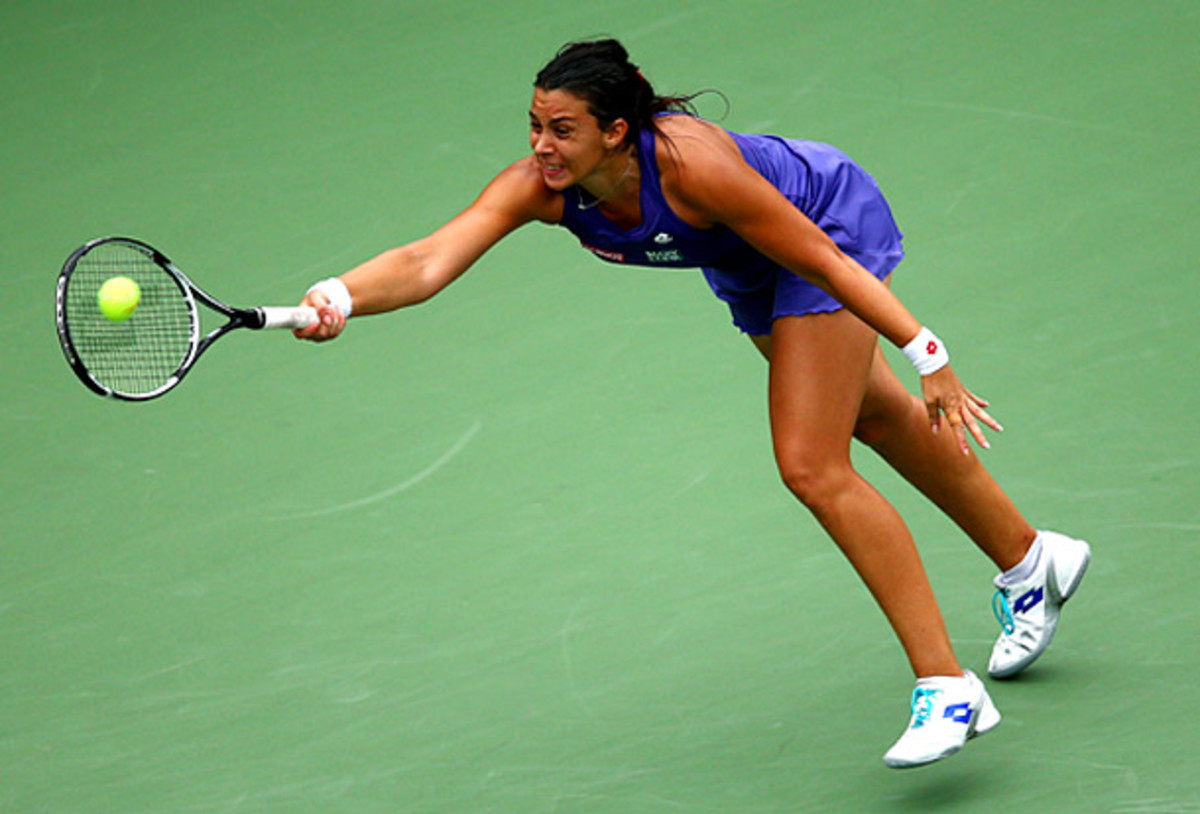
Marion Bartoli: B-plus. I'm just going to come out and say it: No one is as entertaining to watch as Marion Bartoli. ESPN had to dig deep into the thesaurus to find at least 15 ways to call her "weird," "strange" or "kind of a nutter" without actually using those words. I believe "eccentric" was the nom du jour. Bartoli's uncanny ability to fight and will herself to success was on full display against Kvitova and Sharapova, matches during which she shadow-swung, fist-pumped every two seconds and sprinted to her chair after winning a big game (or not-so-big game).
Milos Raonic: B. Raonic had no answers in the fourth round against Murray, who played a strong match. But it was a good showing for Raonic as he matched his career-best finish at a major. And, for my money, the 21-year-old Canadian is one the best postmatch interviews on the ATP Tour. Thoughtful, knowledgeable and willing to talk about X's and O's. (Here are his comments after losing to Murray.)
Ana Ivanovic: B-plus: Her draw opened up with Caroline Wozniacki's first-round exit -- and yes, I'm not giving Woz a grade because, let's face it, it feels cruel these days -- but Ivanovic's problem over the last few years has been more about her head than her game. So her ability to hold her nerve in the third set to defeat Sloane Stephens and make her first Slam quarterfinal since she won the 2008 French Open was great progress. Ivanovic has had to answer more than her share of questions about choking during the last four years. To her credit she has never brushed them off, instead giving thoughtful, heartfelt answers that would make Freud cry. Good on her for persevering.
Samantha Stosur: B-plus. The defending champion went down the way defending champions should go down: by fighting hard and playing well. Her 6-1, 4-6, 7-6 (5) quarterfinal loss to Azarenka (against whom she had never won a set in six previous meetings) was the best women's match of the tournament, and Stosur made the No. 1 dig deep and prove why she occupies that top spot.
Jo-Wilfried Tsonga: D. Tsonga was flat in his second-round loss to Martin Klizan. "I don't really know why it was like this," Tsonga said, "but sometimes it's happened with me." Yes, sometimes it does, Jo.
Richard Gasquet: C. Good news: Gasquet made the fourth round of a Slam for the 14th time (including the fourth time this year). Bad news: With his loss to Ferrer, Gasquet fell to 1-13 in those fourth-round matches. (Gasquet made the semifinals at Wimbledon in 2007.) Sometimes consistency isn't something to brag about.
Ryan and Christian Harrison: A. Do we have another set of American brothers ready to rock the doubles scene? The Harrisons beat the fourth-seeded Mariusz Fyrstenberg and Marcin Matkowski in the first round and knocked out another talented team in Great Britain's Colin Fleming and Ross Hutchins in the third. Their sibling dynamic was on full display, as big brother Ryan couldn't contain his excitement with the victories while 18-year-old Christian was cool as a cucumber.
Bernard Tomic won only seven games in his second-round loss to Andy Roddick. (Al Bello/Getty Images)
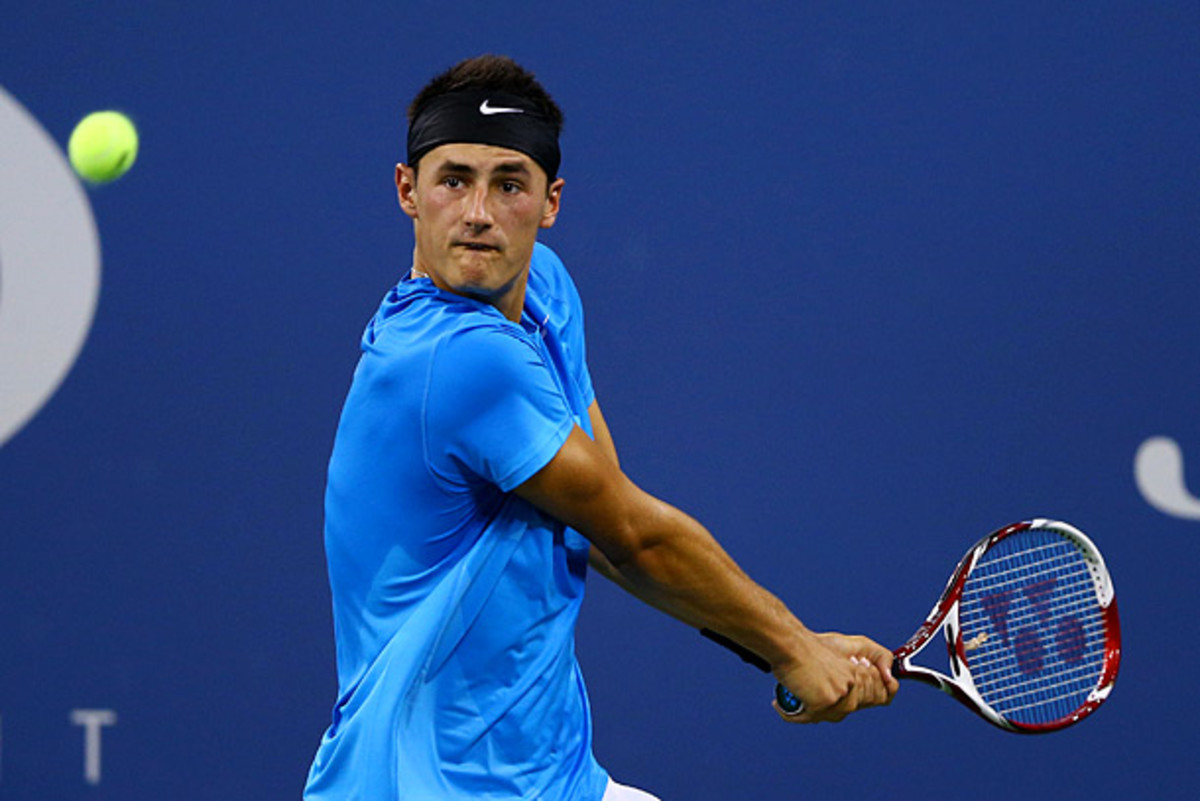
Bernard Tomic: F. If only Tomic had as much fight on the court as he does off it. His second-round loss to Roddick, during which he dropped the third set 6-0 in a blink, reinforced his reputation for being a flaky competitor. He seemed to admit to tanking afterward and when a reporter gave him an opportunity to clarify his comments, Tomic lashed out. Someone get this guy some media training.
Sloane Stephens: B. Not quite a breakout tournament but another solid showing for Stephens, who matched her fourth-round run in 2011, losing to Ivanovic each time. A charming personality and bright smile make Stephens a marketing gold mine, but it's important to keep the expectations in check for the 19-year-old. ESPN backed her heavily in its broadcasts, trying to sell her as the next Serena. Stephens is very much a diamond still in the rough and I worry the hype will only consume her.
The Collegiates: A. After weeks of turmoil created by the NCAA's misguided attempt to reshape college tennis, a dorm full of players -- led by Mallory Burdette of Stanford and Steve Johnson of USC -- showed that the college system can create players who can compete with the world's best. College tennis got its time in the spotlight as a model for aspiring players who aren't sure they can cut it on the professional tour at 18.
CBS: C. I'm tempted to give CBS a lower grade but its coverage really was just par for the course. We can talk until we're blue in the face about the idiocy of Super Saturday (which we may not see next year), or Monday finals, or having to keep the trophy ceremonies (and thus the victory speeches) short in order to jump to the next program. But the most egregious foot fault? Local CBS affiliates not even airing Monday's men's final. During our live blog of the match, I received a lot of comments from frustrated fans who either couldn't find the channel for the match or were enraged to learn that they couldn't even watch the final of a tournament they had been following religiously all week. The decision was disrespectful to fans and the network continues to bumble around in the way it handles these Monday finals.
ESPN: B. The network will never fail as long as it employs Darren Cahill, the best analyst in the game. Brad Gilbert and Pam Shriver may rub some fans the wrong way, but I love Gilbert's everyman energy and Shriver's brash and often-hilarious work. Both are keen courtside reporters who see the little things that can make the difference. Chris Evert was much improved, given how much stick she got in her first few Slams in the booth. But the Donald Young punching-bag session led by Patrick and John McEnroe and the blind eye ESPN turned toward the Townsend story were misguided.
Tennis Channel: B-plus. If you're a tennis die-hard, Tennis Channel is your salve. Its long sit-down interviews with players were fun and informative. Commentators such as Lindsay Davenport and Martina Navratilova were insightful. And the network actually reported on and discussed the USTA/Townsend controversy. In fact, Tennis Channel even invited her onto the set. ESPN may have its own understandable agenda of wanting to push the champions and top players, but for a broader view of tennis -- which I argue is more important than people think -- TC hit it out of the park.
USTA: C
please
